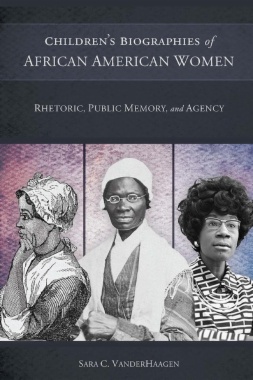A study of how rhetoric has shaped the life stories of African American role models in children's literature
In Children's Biographies of African American Women: Rhetoric, Public Memory, and Agency Sara C. VanderHaagen examines how these biographies encourage young readers to think about themselves as agents in a public world. Specifically VanderHaagen illustrates how these works use traditional means to serve progressive ends and thereby examines the rhetorical power of biography in shaping identity and promoting public action.
Drawing on scholarship in rhetoric, memory studies, and children's literature, VanderHaagen presents rhetorical analyses of biographies of three African American women—poet Phillis Wheatley, activist Sojourner Truth, and educator-turned-politician Shirley Chisholm—published in the United States during the twentieth and twenty-first centuries. VanderHaagen begins by analyzing how biographical sketches in books for black children published during the 1920s represent Wheatley and Truth. The study then shifts to books published between 1949 and 2015. VanderHaagen uses a concept adapted from philosopher Paul Ricoeur—the idea of the "agential spiral"—to chart the ways that biographies have used rhetoric to shape the life stories of Wheatley, Truth, and Chisholm.
By bringing a critical, rhetorical perspective to the study of biographies for children, this book advances the understanding of how lives of the past are used persuasively to shape identity and encourage action in the contemporary public world. VanderHaagen contributes to the study of rhetoric and African American children's literature and refocuses the field of memory studies on children's biographies, a significant but often-overlooked genre through which public memories first take shape.
- Cover�������������������������������
- CHILDREN’S BIOGRAPHIES of AFRICAN AMERICAN WOMEN����������������������������������������������������������������������������������������������������������������������������������������������������������������
- Title�������������������������������
- Copyright�������������������������������������������
- Dedication����������������������������������������������
- CONTENTS����������������������������������������
- ACKNOWLEDGMENTS�������������������������������������������������������������
- CHAPTER ONE LOCATING MEMORIES and AGENTS IN CHILDREN’S BIOGRAPHIES����������������������������������������������������������������������������������������������������������������������������������������������������������������������������������������������������������������������
- CHAPTER TWO PUBLIC MEMORY as a RHETORICAL HERMENEUTIC�������������������������������������������������������������������������������������������������������������������������������������������������������������������������������
- CHAPTER THREE “A WORLD of INSPIRATION” Biographical Sketches in Early African American Children’s Literature
- CHAPTER FOUR PREFIGURATION The Agent Placed in History
- CHAPTER FIVE CONFIGURATION The Agent Writing History����������������������������������������������������������������������������������������������������������������������������������������������������������������������������
- CHAPTER SIX REFIGURATION AND APPROPRIATION: The Agent Reading History�������������������������������������������������������������������������������������������������������������������������������������������������������������������������������������������������������������������������������
- CHAPTER SEVEN “SANITIZE and SIMPLIFY” Beyond Contemporary Cynicism
- NOTES�������������������������������
- BIBLIOGRAPHY����������������������������������������������������
- INDEX�������������������������������

